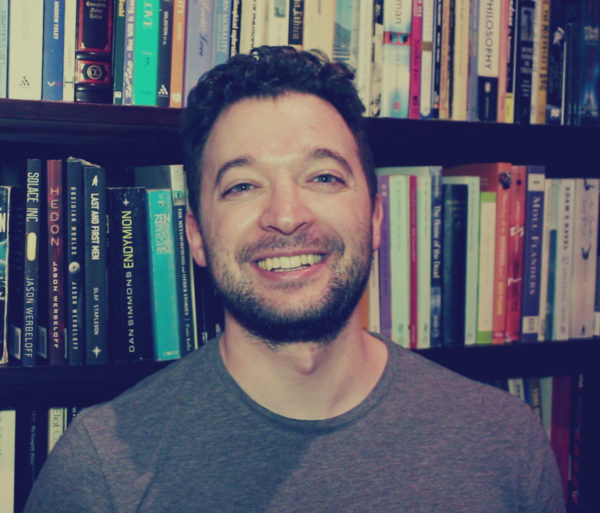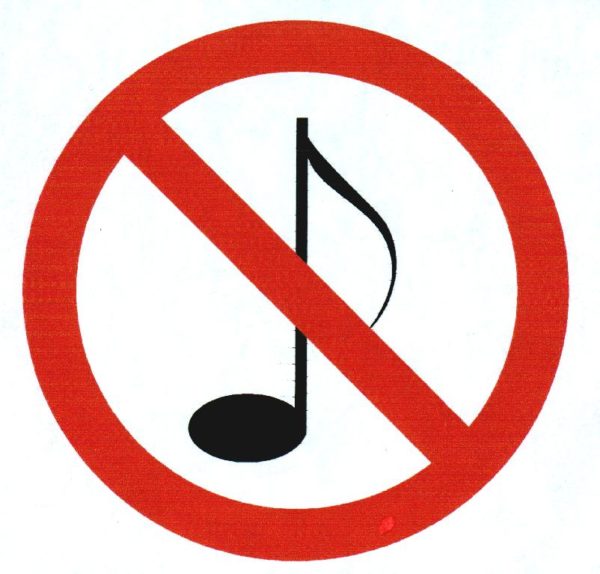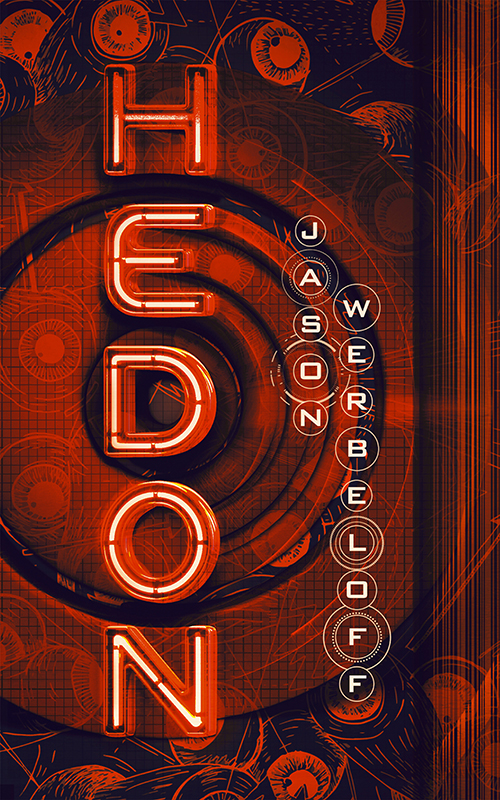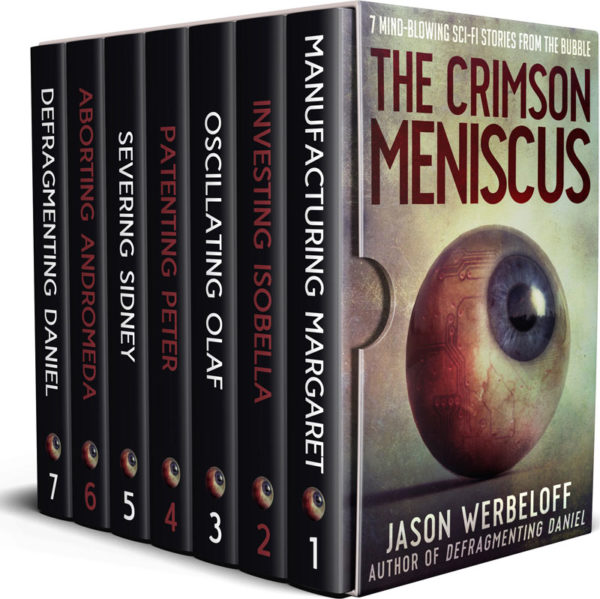interview by Michael McCarthy
I’m what you could call a book-aholic. I’m addicted to books. I’m so glad that Kindles came along when they did because I own so many hardcover books that I’ve long stopped counting. I’ve filled over five bookcases with them. Point being, I’ve literally run out of room. So, now my obsession is e-books. I download so many of them; it’s insane. I’d say I download an average of 5 per day. All legally. Free books advertised in newsletters like Bookbub, Freebooksy and Book Lemur. The self-publishing revolution is happening now and thousands of authors are giving away their first few books for free, just to try to find an audience. One free book I downloaded recently was Defragmenting Daniel by the subject of this interview, novelist Jason Werbeloff. I knew it was a series when I started it, but I had no idea if it would pull me in. Sometimes self-published books have great covers but the insides are rotten. Not so with Defragmenting Daniel. I immediately fell in love with its story about Daniel, a man who lives in the Gutter, where the poor people have been pushed aside to in the book’s wildly imaginative, futuristic world. Daniel has basically lived his life on an organ farm. After seven of his organs have been removed, Daniel decides to leave. He’s had enough. He’s lost enough. So, Daniel decides to penetrate the Bubble, which is where the wealthy people reside. And he has a mission. To get his organs back.
At first, I found myself rooting for Daniel. Damn those rich folks who now have his organs. I totally sympathized with him. But then we’re introduced to Kage, a private investigator who’s down on his luck and hopes hunting Daniel down will earn him a nice bounty. At first, Kage seems to be a trainwreck. You sympathize with him because until recently he was Kassandra and now he’s had surgery and has himself a penis, but he desperately needs hormones for the transplant to be successful and hunting down those hormones — and finding the money to pay for them — is not easy. He’s a likable character and you want him to succeed in retrieving the hormones, but you don’t see how he could possibly catch Daniel. And you don’t want him to. You want Daniel to succeed in getting all of his organs back, rich people be damned. But, eventually, Kage gets on Daniel’s tail and so begins a classic — albeit, homicidal — game of cat and mouse. One that made me immediately buy book two as soon as I’d finished reading book one. And I bought book three as soon as I finished book two. Very suspenseful stuff. And after I’d finished the series, my natural instinct was to want to interview its author, the previously mentioned Jason Werbloff. Fortunately, he wanted to chat with me and we managed to connect via Skype, me in the Lowell area of Massachusetts, him in Johannesburg, South Africa. It was my first time doing an interview via Skype and I don’t think I’d ever interviewed anyone who was quite that far away before either. In any case, it all turned out nicely and I hope you’ll enjoy reading it.
The music videos accompanying this interview were chosen by Jason himself because they’re among his favorites. Enjoy.
MM: First of all, is Jason Werbeloff your actual last name or is it a pen name?
JW: That is actually my real name.
MM: Do you publish anything under another name?
JW: No, I’ve published everything under that name.
MM: You presently reside in Johannesburg, South Africa and previously lived in the coastal town of Sedgefield. Did you live anywhere else prior to Sedgefield?
JW: I grew up here in Johannesburg and then I moved to Sedgefield for about two and a half years. I bought a chicken farm there. And then I moved back to Johannesburg after that, which is where I am now.
MM: What was it like living on a chicken farm?
JW: It was many things. [Laughs] It was idyllic in many ways. Beautiful. It was set in a forest near the ocean and it was magnificently beautiful. Unfortunately, those forests recently burned down. That coastline. So, I suppose it’s a good thing I left. That’s where I started writing. When you have time and space then you start to write, I suppose. On the other hand, it was quite lonely and there weren’t a lot of people around.

MM: Johannesburg is a big city, right?
JW: It is. Yeah, it’s a bustling city. Very different from a coastal town and a chicken farm. Lots of people. Lots of energy. A very interesting place to be. You meet a lot of characters. My books are full of Jo’Burgers. Yeah, it’s a great place to live.
MM: What would you say are your favorite and least favorite things about the city?
JW: A favorite thing about the city is probably the vibe. If you’re bored, there’s just an infinite amount to do here, which is fantastic and it’s full of excitement and threats. Jo’Burg has one of the highest crime rates in the world, which is probably the thing I like least. But it does keep you on your toes. And it sort of forces you to become aware of what’s around you and to really know where you’re comfortable and not comfortable. So, it has its pros and cons.
MM: Is the crime widespread throughout the city or is it just certain neighborhoods that are bad?
JW: There are certainly places that are more dangerous. There are places in our central business district that you don’t want to be after dark. It resembles something like a war-torn area. It’s really not pleasant. But that crime does leak into even the more suburban, high-end areas as well. It’s not nearly as prevalent in high-end areas, but there is crime everywhere. And in my neighborhood, which is a very good neighborhood. My ex-partner, his car was almost stolen just outside of our apartment. These things happen.
MM: Part of city life everywhere, I suppose.
JW: It is, yeah.
MM: I know the city was known for gold and people came from all over to search for it. Are there still any gold mines there?
JW: Yeah, there’s plenty of gold mines here. The Zulu word for Johannesburg is iGoli, which means city of gold. And there are still gold mines. Not in the central city, but in the southern part of the city. And there’s a lot of mine dumps. So, those are non-functioning mines, but there are still functioning mines and some of the largest mining and gold companies in the world are here. Gold is certainly still a part of our economy.
MM: Did you write when you were a kid or teenager or was it only in your adult life that you started?
JW: I wrote my first book when I was nineteen. And it was horrifically bad. It was called Muted. M-U-T-E-D and it was a gay coming of age story, which is incredibly different from anything I write today. It was very weak, but they say that your first novel is always autobiographical. And after that you can put that aside. Preferably, burn it. And then you can start writing properly. And I wrote that when I was nineteen and then I didn’t write anything else until I was 29. When I turned 29 was when I started writing science fiction, which is what I write today.
MM: Do you intend to always write sci-fi or do you have ideas in your head that aren’t?
JW: It’s a good question. So, science fiction is my primary genre but I write what might be called genre science fictions. I mix it with other genres. I really enjoy mixing horror elements. And thriller elements. And I insert detective stories into my science fiction. But a lot of science fiction authors do. Like Philip K. Dick. What’s interesting about science fiction is that what makes something science fiction is that it has science tech in it. Or, it’s speculative fictions, so it occurs in a future age. You speculate how things will go. But that provides a blank canvas. So, you can insert other genres into that. You can insert romance, thrillers, horrors, mysteries. So, science fiction is sort of like a blank canvas set in a different place. I’m experimenting with throwing in different elements into that. At the moment, I’m really interested in horror. But it all happens overlayed on a science fiction palette.
MM: Did you do any other writing, like journaling?
JW: Yeah, so, I have a phd in philosophy. I wrote a lot of academic philosophy. I wrote a phd thesis. And I wrote some articles. I just recently published an article on patriotism. I do write with a sort of academic bend as well. And then I try to combine that sort of philosophical academic writing with science fiction. I have a blog where I write philosophy of science fiction posts. Specifically about film. I’ll take a film and analyze it. Like I’ll take Star Trek and analyze it and look at the science fiction elements and the philosophy in those elements.
MM: How often do you write? Do you do so more so in the morning, afternoon or evening?
JW: These are relative terms for me because I’m a night owl. So, I usually get up around noon and then go to sleep only at about four AM. So, my morning is most people’s afternoons. I’ve been experimenting with different writing schedules. In the past what I used to do is I would write throughout the day whenever I would get time, but recently I read a book by Chris Fox. I can’t remember the name of the book. I think it’s called 5000 Words Per Hour or 5000WPH. Basically, what he recommends is that you do writing sprints. You write for an hour a day and you can split that up into two or three 20 minute increments. I’ve been doing that recently and I’ve tripled my word count for the day, which is really cool. In the past I would struggle to get a thousand or a thousand five hundred words a day and now I’m easily getting 3000 words out per day. And in terms of when I do that, well, I usually do it afternoons and evenings.
MM: And you’re just doing it for 20 minutes each time then or could you do an hour a day?
JW: I couldn’t do hour sprints. That would kill me. I’ve done it for about three weeks now and I’ve been doing three times 20 minute sessions. And this week I’ve actually burnt out. Writing that amount each day has really gotten to me. It’s difficult to sustain that. Really because the problem is that it’s not just writing, it’s planning. So before you sit down, if you’re going to write that quickly, you have to plan it out. That’s become the issue. The issue is my imagination has to catch up now to my writing.
MM: I’m finding as I write the fourth book in my young adult, urban fantasy series that I have to plot ahead more. It’s kind of different for me because I’m used to just sitting down, re-reading the last ten pages I wrote, and then just leaping off from there.
JW: Yes, yes. So, I do plot my novels ahead, but not in intricate detail usually. Normally, what I would do, I would have an ending in mind. And I’ll have a beginning in mind and then I’ll kind of write from there. But with this method you sit and you write sprints so you’re not allowed to backtrack or change a word or correct a typo. You just write and write and write. And you have to write as quickly as possible. And that forces you to know what you’re going to write before you start. At least have a vague idea of what you’re going to write with all the kind of dialogue that will happen, the kind of action that will happen. And I think, like you, it’s quite difficult to plan that all ahead of time.
MM: What’s the rest of your routine like. Do you drink coffee or some other beverage of choice when you write? Do you listen to music?
JW: So, I don’t drink coffee. What I do do is sometimes I use an app called Coffitivity, I don’t know if you’ve heard of it. It simulates the sounds of a coffee shop in your own living room. I recommend trying it out. That’s great. Music, I don’t do and the reason is because I try to get into the same state every time I write, but I can’t do that if the music is different each time.
MM: With me, I have to listen to music. But it has to be music that I’m not very familiar with yet so my mind doesn’t get too hooked on it. It’s not like my mind starts singing a catchy song because these songs aren’t so catchy for me yet.
JW: Yes, yes, yes. I understand. I find it difficult not to get hooked on the music.
MM: Do you write your books in a linear fashion or do you write scenes out of order?
JW: I always write it in a linear way. I know there are authors who write a scene here and a scene there, but that’s just not how my brain works. I have a reason for this, though. So, if you get to a point in the book, and you don’t want to write the next scene, so you move onto another, and come back. There’s a reason you don’t want to write that next scene and that reason might be that it’s not a good scene. It might not be compelling. It might be a boring scene. And if it’s not compelling and if it’s boring for you as the writer, it will also be boring and not compelling for the reader. So, that’s why I force myself to always write in a linear fashion because if I hit a bump I know there’s probably an issue there. And that will be an issue for the reader as well.
MM: That’s true. I write in a linear fashion, too, but I never thought of it that way. So, how often do you experience writer’s block?
JW: [Laughs] I’m experiencing it today. It’s not a pleasant feeling at all. It’s not nice. So, what I do when I experience writer’s block is I then focus on something else. Today, I’ve just been marketing. And I’m trying to get Facebook advertising up and running. And what I’ll do, I’ll just concentrate on that other thing obsessively. Dive into that other thing until I can’t stand it anymore and want to write again. And that helps a lot. Also, when I experience writer’s block I read a lot of other authors. I read a lot and that’s what sort of galvanizes my imagination back into gear.
MM: What software do you use when you write? Or do you write by hand?
JW: I don’t write by hand because I find that the transcription from handwriting to typing is in itself a lot of work. It doubles the writing time for me. I have Scrivener, which I do use sparingly. I use it to plan out a book when I first start writing and I also use it for its character outlines, which I find very useful. And I use it just to record facts about the book like timelines. But the actual writing of the book I do entirely in Word.

MM: I’ll have to try Scrivener. I bought it a while back because someone told me you could use it to make epub and mobi files.
JW: You can, yeah. I haven’t tried that.
MM: After I bought it, I was advised that Jutoh does a better job of making those files so I bought that and that’s what I’ve been using. And I’ve never tried doing anything with Scrivener yet.
JW: Interesting. I’ve never heard of Jutoh.
MM: It’s a pretty simple little program, but it takes some getting used to. It does the job, though. What do you use to make your epub and mobi files?
JW: I produce a well formatted Word file then I use Smashwords – their meat grinder – to convert to epub and mobi.
MM: Are all of your books wide [releases] or are any of them Amazon exclusives?
JW: Some of them are exclusive. My most sold series is Defragmenting Daniel and that’s exclusive to KDP [Kindle Direct Publishing]. I have two short story anthologies. The one is Obsidian Worlds, which I recently got a Bookbub on. And that is wide. And I’ve just today released another short story collection called The Crimson Miniscus. The individual stories that make it up are wide, but the collection as a whole is just on Amazon.
MM: I didn’t know you could do that. I thought the entire contents of the book had to be exclusive to Amazon.
JW: The collection is just on Amazon, but it’s not in KDP Select [also known as Kindle Unlimited]. It is because the last book in the collection is Defragmenting Daniel book one, which is on KDP Select. So, the other stories are wide but the collection as a whole is just on Amazon but it’s not enrolled in KDP Select.
MM: Before you started self-publishing, did you try to get an agent or publisher the traditional way?
JW: No, I didn’t. It could be my kind of political leanings that pushed me that way. I don’t like the idea of a publisher having the rights to my work. Also, I like to control every aspect of my work. I’m not a control freak in other areas of my life, but when it comes to my work I am. Even though I had to work at marketing. In the beginning I wasn’t very good, but I’ve started to improve now. Even if it’s weak, I still want to be in control of that process. So, I never approached a publisher to take it over for me and I never approached an agent. For me, it’s always about making it on my own.
MM: That’s admirable. How did you learn about self-publishing? Did you take a course?
JW: I just did an enormous amount of online research. And trial and error. A lot of trial and error. There are online courses, like Nick Stephenson’s course and Mark Dawson’s. I recently did enroll for Nick Stephenson’s course. His 10,000 customer course. But that was very recently. Only in the last few months. I’ve been publishing for about four years. Self-publishing. You can learn almost everything you need to learn by doing online research. Reading blogs. Being part of author Facebook groups. Chatting to other authors. It’s an enormous amount of information to reach in bit by bit. If it was someone who was just starting I would recommend they do something like Nick Stephenson’s course.
MM: I took Mark Dawson’s, which was very informative.
JW: Do you think the information is good?
MM: I do. But I will say, though, that if you hang out in the Self Publishing Formula group – the one they call the secret one –
JW: – I’m part of that group, yeah.
MM: If you follow that group you’ll learn just about everything you’d learn in his course for much cheaper.
JW: Yeah, I’d agree with that. So, I follow him. I follow Nick Stephenson. I follow Derek Murphy. Derek Murphy did the cover for my first novel, Solace Inc. I follow him as well. He’s very good. There’s quite a few of them that are excellent.
MM: Do you buy barcodes for your books or do you just use the ones Amazon gives you?
JW: I use the free ones that Amazon and Createspace and Smashwords give. I’ve never bought one of my own. Do you buy your own barcodes?
MM: No, I don’t. I’d like to, but I just don’t have it in the budget.
JW: Why would you want to, as opposed to taking the free ones?
MM: Because you can get a lot of local bookstores to carry your books, but they all want a regular barcode on them. If they scan the regular Amazon one it doesn’t come up in their system.
JW: I see. OK, OK. I’ve not focused on selling physical books locally. I did initially for my first books. But in South Africa our reading market, especially in science fiction and genre fiction, is so poor that the numbers just don’t make any sense. So, that’s why I never go that route.
MM: I actually haven’t gone through the process on Createspace to make a printed version of my latest book yet. I find the process just so frustrating, trying to get it right.
JW: I run a small business on the side helping authors self-publish. Especially the local authors here. I’ve typeset a few of their books for Createspace. Initially, it’s an enormous amount of tinkering, but once you’ve set up a good template and you know your fonts and your outlines it works quite nicely.
MM: If you don’t mind my asking, do you have a day job or are you able to support yourself from writing at this point?
JW: So, before I started, when I was 29, I ran a software development business for about six years. And I’d saved up some money from that and I’ve been living off those savings for the last four years while I’ve been writing, trying to get my author career off the ground. So, I’ve been working full-time as a writer. I have lectured a bit on the side until two years ago. And I do do maintenance work as part of the software development business and the maintenance pays for about a third of my annual expenses. But then the rest I live off savings. But hopefully not for much longer. Hopefully, the author income will be sufficient to allow me to live off.
MM: I’m hoping that will happen for me sometime in the future, but it certainly isn’t happening overnight.
JW: No, it takes time. How long have you been doing it?
MM: Just since March of this year. I’ve put out three books so far.
JW: No, it takes time. I’ve been going for four years. I’m hoping that my next series, which is coming out next year, will be the breakthrough. But even over the last year, if I look at my income it keeps leaping. And, yeah, it does happen but it takes time. A lot of authors say you need at least seven full-length books in order to start to make some money. And I think it takes years. There are exceptions. People who manage it early. But I think it takes years.
MM: How often do you send out newsletters to your subscribers?
JW: I used to send out monthly when I first started. I was very scared of irritating people and having them unsubscribe. And that is a great myth, that people will be irritated if you send too regularly. I follow a very interesting marketer named Josh Earl and he says if you send people infrequently, you must realize that not everyone opens every e-mail. So, it’s likely that they’ll only open every second email or every third e-mail. So, if you’re sending once a month, they’re only seeing your work every three months. And they’ve probably forgotten who you are a few months later. And they’ll think why is this bothersome person e-mailing me and they’ll unsubscribe. What he does is he sends daily or at least weekly. When I heard that I was terrified and horrified and I thought I was going to get tons of unsubscribes, but I slowly moved them from once a month to once every two weeks to once every week and now it’s about twice a week on average. My total number of unsubscribes for the month is only slightly less now than when I was e-mailing monthly. And my open rates and click through rates are even higher than before.
MM: What’s the biggest newsletter you’ve advertised in so far? You mentioned Bookbub. I guess that’s probably the biggest one out of them, right?
JW: Yeah, yeah. So, I was really pleased about that. Unfortunately, they didn’t advertise me in the United States. They advertised me everywhere else. So, the United States is much, much bigger than everywhere else so that was a pity. It was on September the 11th so they might have said no because it was September 11th. But they did push it in the UK, Australia and India. And that’s been fantastic. It’s one of the first promotions that I’ve had that’s resulted in a net profit. Most paid promotions don’t.
MM: Yeah, I’ve found that if you give the books away you’ll get a ton of downloads but it seems like if you want to sell one a lot of times they don’t do too well.
JW: That’s right. I reduced Obsidian Worlds from 2.99 to 0.99 and I got about 550 sales in the first day or two and that already offset the cost. And now it’s selling quite nicely at full price in the UK. And it hit the number one best-seller in three or four categories in the UK in those first few days. So, I was really happy with that. I’d never had results like that before. Bookbub is quite phenomenal if you can get on. I’ve been trying to get my series Defragmenting Daniel on for about a year now and they just won’t take it. So, I’m looking at re-doing my cover so that they’ll take it.
MM: Why? Have they specifically said that’s why they’re not taking it?
JW: No, Bookbub is maddeningly vague. They just send a form letter every time they reject, saying that the book isn’t suitable and here is a list of reasons why it may be and they send you to their blog. They don’t give you specific reasons. But Obsidian Worlds has a really strong cover. The book that they did accept. And I paid a lot more for that cover than I did for Defragmenting Daniel. And I think they took it because of the cover.
MM: Who else have you used for cover designers?
JW: My very first cover was The Solace Pill and I used Derek Murphy for that. He’s now way too busy to do covers and way too expensive. And after him I used a company called Book Fly and the cover designer – his name is James Egan – I think it was Egan, but their website is bookfly.com. And he’s done some very high profile authors like Larry Niven and R.R. Martin, but when I contacted him he was still starting out. It was relatively affordable and he did two covers for me. Obsidian Worlds and HEDON and those covers are beautiful, I think. I love those covers. They’re not really graphic based. It’s all about text and Obsidian Worlds, that was the one that Bookbub took. Since then, I’ve been using cheaper cover designers because James has become very expensive. So, for Defragmenting Daniel I used a pre-made cover by a designer named James – I can’t remember his surname, but his website is goonwrite.com. He has a lot of very good pre-mades and I use him for my short stories a lot and I found quite a nice one for Defragmenting Daniel so I used that. But you can see it’s a lot cheaper than the expensive ones.
MM: With Defragmenting Daniel you used the same cover for all three books. What gave you that idea?
JW: There’s two things. One is cost. It’s more expensive if you want a fresh cover for each. The second thing is that the books are not independent in that series. There’s three books and I advertise it as a series because the books are each about 45,000 words. But, really, it’s a serial. Because the books follow on from each other and you can’t read one without the others. So, it made a lot of sense for me to serialize the covers rather than having fresh covers. Next year I’m releasing a new series, which is more like a series than a serial. I will obviously be using different covers for each book but trying to keep the theme the same.
MM: If a publisher were to come along now and want to release one of your books in hardcover, distributed everywhere, in stores like Barnes & Noble, would you consider it? Or are you doing well enough now that you can see that you don’t need that?
JW: It would depend on what the deal was. With Hugh Howie, what happened was a publisher wanted the right to his print books. And he retained the rights to his e-books. I would be very happy with that because I don’t move a lot of physical copies. So, I would be happy for a publisher to take the physical copies off of my hands and publish those wide. That’s fine. But it would have to be a really good deal for them to get the rights to my e-books.
MM: What do you say to authors and publishers who are saying that self-publishing is ruining the business?
JW: Well, I would definitely say that their business is being ruined, but not by self-publishing. Traditional companies – traditional publishers – are really struggling to keep up with indies but the reason is not because there’s a glut of indies at low prices. That’s what they’re arguing. I think the reason is that they’re charging outrageous prices for their books. So, they’re charging these prices, which are often over 10 dollars for an e-book. And I don’t know how they can justify that. When a self-published indie comes along with a book that’s almost as good, or sometimes better, and they’re charging 2.99 or 3.99 as opposed to 15.99 or 19.99 [what do they expect]? If the traditional publisher’s moaning about that then that’s their problem. They need to drop their prices.
MM: Exactly. Exactly. If Amazon can sell books that are a third less of the cost than in traditional bookstores then obviously the traditional publishers could lower their prices and still make money.
JW: Yeah, definitely, yeah. Especially if you look at the royalty system. Amazon’s royalties are 70 percent from 2.99 to 9.99. And they go down to 35 percent when you go over 9.99. So, it’s pointless for them to sell a book for 14.99 when they’re getting the same royalties they’d be getting at 7.99. They should be dropping their prices to at least 9.99.
MM: Especially for e-books. If you look on Amazon, half the time the actual printed book costs less than the e-book.
JW: Which is insane. Because there’s no cost associated with an e-book. So, why are they doing that?
Read part two of our interview with Jason.
Newsletter: http://smarturl.it/werbeloff
Amazon author page: http://www.amazon.com/author/jasonwerbeloff
Facebook: http://www.facebook.com/solaceseries
Twitter: @JasonWerbeloff
Goodreads: http://www.goodreads.com/author/show/7340789
Website: http://www.jasonwerbeloff.com
SoundCloud: http://soundcloud.com/jason-werbeloff










Leave a Reply